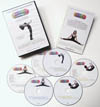How to Avoid Holiday Tummy Trouble
by www.SixWise.com
Turkey with stuffing, mashed potatoes with gravy and a side of upset stomach seems to go hand-in-hand with the holiday season. The next few months of celebrations -- Christmas Eve, Christmas Day, Hanukkah, Kwanza, New Year’s and for those sports fanatics, the Superbowl, all involve loads of fatty foods that are prime triggers for stomach problems like heartburn and other digestive disorders.
|

Overindulging through the holiday season may not settle well with your stomach. Keep reading to find out several all-natural solutions to help relieve your symptoms and address the root cause of certain tummy troubles.
|
The Heartburn Path Starts in Your Stomach
Breaking down the word heartburn you might think it has something to do with your heart, but on the contrary it begins in your stomach when acid backs up into your esophagus, the narrow tube that carries food from your mouth to your stomach.
Under ideal circumstances, once food is consumed and hits the base of your esophagus, the esophagus works to keep the food down. When heartburn strikes, the esophagus fails to do its job and opens too easily, allowing stomach acid to rise to the surface.
Most people attribute heartburn to certain foods such as chocolate, citrus, coffee, peppermint, tomato-based products and spicy dishes because it generally happens right after a meal. However, researchers have found little evidence showing that staying away from these foods provides relief. Rather, foods high in fat content tend to be the heartburn-causing culprits.
“High-fat meals delay stomach emptying,” which gives stomach acid more time to back up, explains Dr. Lauren Gerson, a gastroenterologist and associate professor of medicine at Stanford University School of Medicine.
You can still enjoy your holidays and the special foods and treats that go with it by following a few practical holiday heartburn tips.
7 Ways to Enjoy Holiday Foods Without Heartburn
-
Start a food journal -- Track what you eat for at least four days.This will allow you to pick up any emerging patterns, determine the times you eat, how much you eat and most importantly any symptoms you may experience after meals.
-
Don’t deprive yourself of all the foods you think may trigger heartburn -- Eat what you want at first, narrow down the foods that trigger heartburn symptoms, then limit how much you eat of those foods and stay away from them as you approach bedtime.
- Get moving and eat right --Add plenty of low fat, high-fiber foods in your daily diet. These foods have the best track record in reducing heartburn, while greasy, fried and high-fat foods remain the worst offenders.
 Just because it’s the holidays doesn’t give you the pass to gorge yourself. Keep yourself feeling full by eating several small meals throughout the course of the day. Eat your meals mindfully to allow your brain to process that you are full. It’s just as important to walk, dance, do some SheaNetics or some form of daily exercise. Research has shown that maintaining a healthy weight and exercise may help prevent heartburn. We recommend getting everyone up and off the sofa for some fun quick exercise together via the MySheanetics.com mind-body DVD packaged program that is currently on sale at lowest ever affordable prices, plus with first time everFREE
Just because it’s the holidays doesn’t give you the pass to gorge yourself. Keep yourself feeling full by eating several small meals throughout the course of the day. Eat your meals mindfully to allow your brain to process that you are full. It’s just as important to walk, dance, do some SheaNetics or some form of daily exercise. Research has shown that maintaining a healthy weight and exercise may help prevent heartburn. We recommend getting everyone up and off the sofa for some fun quick exercise together via the MySheanetics.com mind-body DVD packaged program that is currently on sale at lowest ever affordable prices, plus with first time everFREE  SHIPPING together with over 40% Savings
SHIPPING together with over 40% Savings
(ONLY $59 vs $95 -- a Pre-Christmas Holiday Offer or until they are Sold Out!)!
-
Resist the urge to lie down on the couch after eating -- Instead get up and do some cleaning or go for a walk around the neighborhood. If you still feel the need to lay down after eating, wait at least three hours before lying down or kicking back on a recliner to take in the football game. Lying down immediately following a meal is a recipe for disaster as it creates easy access for acids to flow through your stomach resulting in heartburn.
-
Watch your alcohol, chocolate and peppermint intake -- All three of these trigger reflux actions due to their tendency to relax the esophageal valve.
-
Fill up on some healthy snacks at home before attending holiday parties -- This will reduce the chances of overeating once you arrive. Once at the party, position yourself a distance away from the hors d’oeuvre table to help with resisting temptations. When you do make it to the snack table, put one or two small snacks on your plate at a time. Focus on spending your time at the party talking with others. That way the focus will be taken off of eating.
-
Don’t let family stress get the best of you -- Since stress is a heartburn trigger, avoid getting in the middle of family spats and other stressful family drama.
When it is More Than Heartburn
While the uncomfortable stomachache may seem normal, and self-diagnosing tummy troubles as indigestion may seem reasonable around this time of year, digestive disease experts warn that it may be a sign that something more serious is going on inside your body -- something that can’t be relieved by taking a few antacids.
Three conditions triggered by overeating that may be causing your symptoms of digestive dysfunction are gallstones, pancreatitis (inflammation of the pancreas) and gastroesophageal reflux disease (GERD), also known as “acid reflux.”
“Around the holidays, people are more likely to indulge in fatty foods, alcoholic beverages and other temptations,” says Dr. Nussbaum. “And if they find that every holiday party they attend ends in mild, but persistent abdominal pain, it may be a sign of a more serious digestive disease that needs immediate medical attention.”
Holiday foods high in unhealthy fats combined with alcohol and in some cases nicotine are a bad mix for existing gastrointestinal conditions.
Gallstones
The gallbladder is a small, pear-shaped sac located under the liver in the right upper abdomen. It releases bile that helps the body digest and break down fats. Gallstones form when liquid in the gallbladder hardens into pieces of stone-like material. One big trigger for gallstones is a high-fat diet, which can throw off the balance, resulting in the liver producing more cholesterol than the bile can handle. This excess cholesterol then turns into small, pebble-like substances called gallstones.
Pain brought on by gallstones, including abdominal pain and nausea, usually occur about an hour after a big meal.
Pancreatitis
Foods need to pass out of the pancreas and into the intestine before the digestive process of enzymes breaking down your foods can begin. The job of the pancreas is to secrete enzymes into the duodenum that join with bile to aid in digesting food. If a gallstone is blocking the exit of the pancreas, digestive juices start to back up into the organ, resulting in dangerous tissue damage and inflammation of the pancreas, also known as pancreatitis.
Experts have linked heavy drinking of alcohol directly to toxicity of the pancreas, which can lead to pancreatitis.
Acid Reflux
Acid reflux, also known as GERD, (Gastroesophageal Reflux Disease) is a chronic condition characterized by a burning sensation in the chest and a difficulty swallowing foods. It happens when the esophagus weakens, causing stomach acids to flow (reflux) back from the stomach into the esophagus. The constant backwash of acid reaction can aggravate the lining of your esophagus.
Experts recommend seeking treatment if you experience any kind of pain for more than 30 minutes at a time. Ignoring symptoms of acid reflux can sometimes lead to more serious health complications such as erosion of the esophagus, bleeding, narrowing of the esophagus or, in some cases, a potentially precancerous condition called Barrett's esophagus.
Why Popping Antacids is Not a Healthy Solution for Tummy Trouble Like GERD
The typical treatment given for GERD are antacids that neutralize stomach acid or prescription medications that reduce or block stomach acid production.
However, stomach acids are critical for proper digestion, and if you don't digest and absorb your food properly you will ultimately increase your risk for many chronic degenerative diseases.
Further, despite the temporary relief, medications designed to reduce acid may exacerbate the underlying causes of acid reflux and one of its most annoying symptoms. By neutralizing what little acid the stomach may produce, the stomach acid insufficiency is made worse. Then, in a desperate attempt to correct the problem, the stomach occasionally produces a surge of too much acid, causing the uncomfortable burning sensation.
Also, reduction of acid in your stomach reduces your primary defense mechanism for food-borne infections, thereby increasing your risk of food poisoning.
Many commercial antacids also contain toxic ingredients such as aluminum and artificial colors and sweeteners. These chemicals not only disrupt digestion, but they also alter the structure and function of stomach lining cells and cause side effects like headache, diarrhea and abdominal pain.
Is There a Natural Solution for Treating GERD and Other Digestive Issues?
|
Rebalance Your Digestive System for GERD and Heartburn Relief

Your digestive process -- where good health begins and ends -- should move along quietly and proficiently. So if you’re experiencing heartburn or other symptoms of GERD it’s a sign that your system is out of balance. The first step to returning health to your gut should be rebalancing your flora with:
-
 AbsorbAid Probiotic from NutritionsFinest.com: Repopulate your digestive tract with good bacteria to restore balance. AbsorbAid Probiotic has 30 billion organisms per capsule, with two clinically effective and dominant genera Bifidobacterium and Lactobacillus: L. acidophilus and L. salivarius in a 2:1 ratio and B. lactis and B. breve, also in a 2:1 ratio. AbsorbAid Probiotic from NutritionsFinest.com: Repopulate your digestive tract with good bacteria to restore balance. AbsorbAid Probiotic has 30 billion organisms per capsule, with two clinically effective and dominant genera Bifidobacterium and Lactobacillus: L. acidophilus and L. salivarius in a 2:1 ratio and B. lactis and B. breve, also in a 2:1 ratio.
-
 AbsorbAid Platinum from NutritionsFinest.com: A vegetable-based digestive enzyme that helps you break down food groups and maximize nutrient absorption while alleviating digestive disturbances including acid indigestion. AbsorbAid Platinum from NutritionsFinest.com: A vegetable-based digestive enzyme that helps you break down food groups and maximize nutrient absorption while alleviating digestive disturbances including acid indigestion.
Special Winter Limited Time Promotion!
-
Buy any 3 products mix or match get 10% discount
-
Buy any 6 or more products mix or match get 15% discount
-
Buy 12 or more products mix or match get 20% discount
Free Shipping on all orders of $100.00 or more!
Learn More and Order From NutritionsFinest.com Now!
|
Probiotics (good bacteria) taken in combination with digestive enzymes will help to restore optimal functioning to your digestive tract and help reduce digestive disturbances such as GERD.
We recommend a high-quality probiotic, such as AbsorbAid Probiotic from NutritionsFinest.com -- a superlative probiotic supplement that provides clinical activities supporting systemic health and wellness through immune-system protection, allergy reduction and effective and enhanced nutrient absorption -- in order to restore balance to your gastrointestinal tract.
AbsorbAid Probiotic is an ideal choice for this purpose because it has 30 billion organisms per capsule, with two clinically effective and dominant genera Bifidobacterium and Lactobacillus: L. acidophilus and L. salivarius in a 2:1 ratio and B. lactis and B. breve, also in a 2:1 ratio. Each bacterial genus-species has its own specific metabolic activities, which lead to their effective inter-species synergism.
AbsorbAid Platinum from NutritionsFinest.com, a vegetable-based digestive enzyme, is also important for proper digestive health. It combines its effective ratio of proteases, amylases, lipases and cellulases with two “acid-tolerant” bacteria or a probiotic combination, Lactobacillus acidophilus and Bifidobacterium bifidum. AbsorbAid Platinum also helps you to break down food groups and maximize nutrient absorption while alleviating digestive disturbances such as acid indigestion.
More Natural Tips for Reducing Symptoms of GERD
Along with taking high-quality probiotics and a digestive enzyme supplement, the following tips may also help to reduce the frequency of heartburn and other GERD symptoms:
-
Drink plenty of pure water.
-
Maintain a healthy weight (extra weight puts pressure on your abdomen and can encourage acid reflux).
-
Wear loose-fitting clothing (tight clothes encourage acid reflux in the same way extra weight does, by putting pressure on your abdomen).
-
Use gravity to your advantage and avoid lying down for two to three hours after eating (this will help the acid stay in your stomach where it belongs). You can also try elevating the head of your bed for this purpose.
-
Avoid smoking.
The following additional supplements may also help to relieve your symptoms:
-
Glutamine—An amino acid with anti-inflammatory properties that is produced naturally in the body that helps reduce intestinal inflammation linked with acid reflux. Some healthy sources of glutamine include beef, chicken, fish, eggs, milk, dairy products, cabbage, beets, beans, spinach and parsley.
-
Aloe Vera—Derived from the aloe vera plant that has been used medicinally for many years for cuts and scratches. It has also been used for stomach upset, diarrhea and inflammation associated with bowel diseases such as ulcerative colitis.
-
Licorice—In the herbal form, licorice has been long used in Eastern medicine for spleen, liver and kidney diseases. It is also used to help digestive disorders by reducing stomach acid levels, coating the stomach wall with a protective coating and relieving constipation.
-
Apple cider vinegar—This natural product extends across the board in support of many ailments such as hay fever and warts and has been shown to produce a calming effect on stomach acid.
-
Sodium bicarbonate—More commonly known as baking soda and used in many households to eliminate odors in the refrigerator, it can also be used as a type of antacid to help relieve heartburn and upset stomach. Experts caution that people with high blood pressure or sodium-restricted diets should not use this remedy.
Recommended Reading
Heartburn? Acid Reflux? You Could be Struggling With GERD
Enzymes: Are You Lacking These Crucial Catalysts to Your Digestion?
The Danger of Antacids and What You Should Do Instead
Still Need Some LAST-Minute Gift SAVINGS Sent To You via FREE SHIPPING:
Why is so much already SOLD OUT?! Don’t SNOOZE, You’ll LOSE
What NOT to Do When Shopping for Holiday Gifts: 11 Key Steps
Sources
Medline Plus
HealthNews November 29, 2005
IFFGD International Foundation for Functional Gastrointestinal Disorder
FoxNews August 14, 2008
National Digestive Diseases Information Clearinghouse, Gallstones
National Digestive Diseases Information Clearinghouse, Pancreatitis
NewsChannel5.com